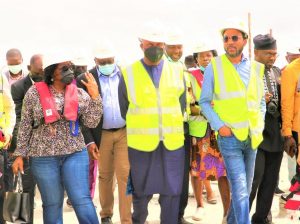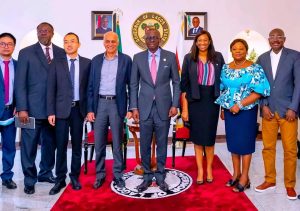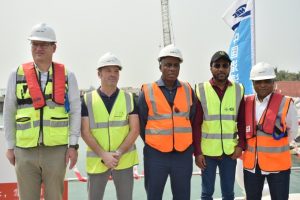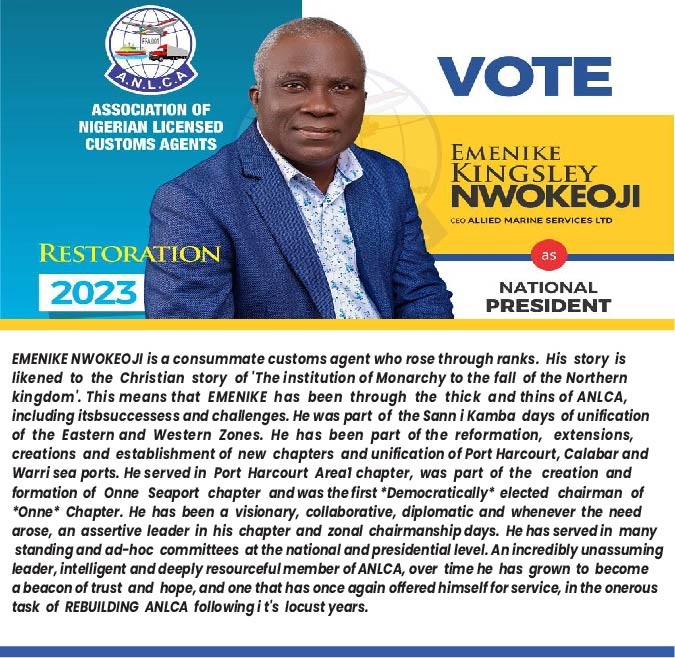Lekki Deep Sea Port: The Sudden Political Frenzy and Likely Costly Gaps
BY EGUONO ODJEGBA
Of recent there has been a tumultuous agitation about the state of the Lekki Deep Sea Port (DSP) by Abuja politicians over its completion, ostensibly for its commissioning ahead of the 2023 general elections.

While the sudden rush is understandable as an urgent and demanding political need to make the delivery of the project an ornament of political campaign, the side effects of the agitation is the inherent probability of the contractor delivering the project at gun-point schedule, and possibly leaving on its trail possible contractual or structural gaps with far reaching consequences.
History has taught us in a rather very bitter way, that majority of our politicians and office holders cherish their personal whims and caprices over and above the national wellbeing, and have been known to run national projects without any sense of responsibility and moral forbearance.
History is replete with the results of their disastrous performances across sectors of the national economy, as also a direct consequence for our oft failed economic blueprints, often delivered at sub optimal capacities.
Perhaps we should leave out the controversial revived railway system for obvious reasons, and look at our hydro/thermal systems and water resources; mining/refining systems and mineral resources (crude and solid); the agro-allied sub sector, coastal trade and our struggling port industry.
Everywhere you look, there’s a long shadow of historical systems defaults and structural wastes traceable to political manipulations and unwarranted fraud by known public figures, living and dead; some of whom are serving in the present government.

Our past failed history should compel us to ask what the motivation is all about for putting the contractor handling the Lekki DSP under intense pressure, when this government is saying nothing about the sub optimal Calabar, Koko and Warri sea ports, saying nothing about our moribund steel plants, petrochemical refineries, airline and automobile plants that are in various state of comatose?
In the past six months, the Minister of Transportation, Chibuike Amaechi has visited the Lekki DSP more than five times, in fact, last week Saturday; he again dragged some heads of government agencies in the industry that ought to be resting to the place. This was barely three weeks after he lasted visited, plus news making the round that President Muhammadu Buhari is scheduled to embark on a tour of the project later today.
Although Amaechi would want Nigerians and the promoter of the project to believe that his concern for the contractor to deliver the project “on schedule” by September 2022, is in the interest of the all stakeholders, truth is he and his Ajuba political gang are eager to use the ‘timely delivery ’ as yet another election propaganda come 2023.
As it is customary with most politicians, the FG propensity to mutilate the facts about the project can only be as smart as the various cobwebs that has been woven around the rail project; in relation to the Chinese connection.
The lullaby about the September 2022 operational commencement date for the Lekki DSP is to say the least, half truth. To put it on a moral scale, the project delivery time line been propagated is a big lie.
The so-called September 2022 timeline is the culmination of the most recent rescheduled dates, after a number of failed prior time lines. It is disingenuous for this government to continue to mislead the nation as though the Amaechi September 2022 Lekki DSP project delivery date is sacrosanct.
It is the forth proposed timeline, the first being 2018. With the failure of other timelines, perhaps, this government feels compelled to achieve the 2022 date, if only to play it up as a political scorecard for 2023.

Thus the transportation minister either by himself or fulfilling the resolve of higher authority and, or collective political fraternity, has practically put the contractor under pressure; raising professional concern in view of defaults or gaps the pressure could engender.
The minister does not have to be an engineer to understand that putting contractors under intense pressure can impact quality negatively and or, could produce other unintended consequences such as design defaults; and any other contractual gaps.
Nor is it his duty as a political appointee to carry out construction supervision and evaluation, which his frequent interferences portend, while those charged directly with engineering, contracts, survey and other sundry supervisions in the ministry sits back in their respective offices, reading newspapers.
Let it be said and very loudly too that the minister has no reason to fret about contractual timeline less than eight months when he frittered away more than six years sleeping and drooling over the same project.
On one of his recent visits, he said “I want to congratulate you for the very huge progress. By the time we came here, there were no civil works; it was just pure sand. You have tried. I am suggesting that if you work day and night you will go far and complete the work before commissioning.
“If the President sees it, approval will be easier. You need to speed up the work so we can get approval from the government side before election, process of election will be completed in July.
“This is because by law, six months to election people start politics and if you wait till that time, you won’t meet anyone in the office,” he said.
It is crystal clear from the above statements that he has appropriated civil service professionals’ views, advice and judgments. Whereas the consequences of his unwarranted interferences may be long term in manifesting, they could prove costly when they do; especially when critical components of the contracts are sidestepped just so to be seen to satisfy the minister’s abridged work template.
As a matter of fact, there are indications that the transportation minister has severally abused and compromised the contractual agreement and the project’s overall operational efficiency; as far as the project’s rail line connectivity is concerned.
While sources familiar with the project informed that the rail line component is part of the original design, the transportation ministry sometime in 2018 made attempts to evade the responsibility and much worse, reportedly attempted to brow beat the contractor to accept the task.
When that attempt failed, Amaechi realized he needed to adopt a more sellable approach and waited until the project entered a critical phase before coming out with the Abuja gang trick, to attempt to psychologically blackmail the contractor to submission; albeit vide appeal.
Rather than the Nigerian Railway Corporation and the Nigerian Ports Authority be allowed to work out the rail line component of the project, the transportation ministry in its usual character curiously takes pride in asserting itself by interfacing between the two agencies.
Logically, both agencies engaged in tactical retreat, leaving the requirement in limbo, a development that led the ministry to reportedly attempt to pass the bulk to the contractor; but which was spiritedly rejected.
Sober and confused, Amaechi has been making political overtures at the contractor to consider fixing the rail line aspect with the promise to work out a repayment plan. But even at that, one can still feel the strong air of official deceit, wrapped in political arrogance.

But humbled by the 2023 election, he came out openly last week to say the federal government does not have money to fix the rail line after all. Those whose business it is to know have warned that the consequences of the missing rail link will logically be the transfer of the Apapa/Tin Can ports traffic nightmare to Lekki Port access roads.
The only way to stave off that danger is for the contractor, China Harbour Engineering LFTZ Enterprise (CHELE), a subsidiary of China Harbour Engineering Company to accept to construct the rail line.
But this can only come easy if the FG approach the matter honestly and transparently, because the Indian Contractor didn’t get involved in the project for charity; the terms have to be straight and unambiguous; devoid of monkey game.
Hear the minister of transportation speak to the press on the matter: “As a Minister of Transportation, I imagined a lot of things that I could have implemented. I imagined that the Lagos-Calabar rail line would start from here, that was my imagination.
“But the Lagos-Calabar rail project needs $11.1 billion funding, there is no such funds at the moment for the project. If we get the 11.1billion as it is, we would probably have to divert the rail line, because Lagos-Calabar rail line actually goes into Lagos city, we can divert it to come to the seaport in Lekki.
“Another advice I could give is if they (contractors) want to invest, they can invest in rail and then the government will either do tax reduction or do something to help them.”
Can you imagine the double speak and arrogance? Is it the FG that is helping the contractor or the other way round?

Again, hear the minister as he deploy a more convincing appeal but through a roundabout way: “As a privately funded project, over time, they (contractors), will collect their revenue from the commercial activities before they hand over to the Federal Government.
“We will collect taxes here, the confidence in giving them (contractors) the project is because of the taxes that we will collect here that will help us in the construction of other projects.”
What the Abuja politician was shy of saying for fear of probably losing his pride was that the contractor should assume the task of fixing the rail line, and that government is ready and willing to discuss the terms, either through tax rebate or something else.
Despite Amaechi’s rush hour rapprochement, the Indian contractor do not appear to be overtly receptive; although it is not impossible they will come around.
During one of the recent visits by Amaechi, one of the construction engineers voiced the concern that the rail line connectivity is purely the FG responsibility; while speaking to one of the journalist on the commencement of the ports pilot operations by December this year.
“Once the government comes with the rail, we will connect and the other one will be with the badges because we have a Lagoon not too far from here, those are the three evacuation strategies we are looking out for” he said.
As attractive as this latter package look, the inherent danger is the loss of the opportunity cost of not including rail line in the initial contract. Any dubious contractor could use the rail line challenge and the helplessness of our government to short change Nigeria.
The avenues are many and open-ended, and no doubt as a consequence of poor planning and monitoring by this government. With the way things are going, Nigeria will be quite fortunate to be able to deliver on the laudable expectations of the 45 years projected joint venture before it reverts to the federal government as a national asset.
This government has created so much hype about the project that it cannot afford to fail to deliver satisfactorily. To do so, the project must be weaned of the Amaechi excessive baggage; and indeed, of any political encumbrances and posturing.
It is not uncharitable to think that the transportation minister has demonstrated far less political sagacity required to drive a gigantic project such as the Lekki DSP. The lax were just too pronounced, because a project of this nature does not respond to mere political fiat but rather to meticulous planning, tied to appropriate economic fundamentals.
Perhaps also, it is about time professionals are appointed to head our transportation ministry as one of the sensitive national economic sectors. With the September 2022 delivery timeline at the corner, it is sad that not much has been accomplished in the area of multiple evacuation corridors, captured in the original project design.
The roads components are still largely at commencement stage, whereas the first phase of the project is just by the corner. It is hard to contemplate if the Lagos State Government that has the responsibility for upgrading the Lekki-Epe axis is being slowed down by the attitude of Abuja politicians.
It will be preposterous to defer the transportation network that will aid evacuation of cargo until 2023 as been speculated, when the port is due to come on stream already.
Aside Lekki Deep Sea Port, another multi-mega industry, the Dangote Refinery is on that axis, with of course, Pinnacle Oil Depot. Experts quoting available data informed that as of December 2021, Pinnacle Oil Depot loaded over 175m litres of petrol (the highest by any marketer).
An insider who pleaded anonymous said unless there is increased massive construction of main roads, feeder and exit roads from the deep seapport, the Lekki –Epe axis traffic situation will be child’s play compared to the Apapa-Tin Can port roads.
“LASG is keeping quiet on the likely impact of increased vehicular movement in that axis in order to be ‘politically correct’ and not to be seen to obstruct businesses coming to the state but the time to start amending errors and constructing more roads and routes for the increased truck movement is now”, he said.
He said according to the government blueprint for the Lekki Free Trade Zone (LFTZ), the whole corridor is expected to be strewn with infrastructure, both land, rail and water, under a seamless transportation system in the first twenty years.
The 16.5meters depth deep seaport is expected to commence operations with an annual throughput capacity of 1.5 million Twenty-foot Equivalent Units (TEUs), which is expected to quickly ramp up to 2.7 million TEUs.
When fully completed, the Lekki DSP will be equipped to handle around 16.7 million MT liquid cargo and 4.0 million MT dry bulk cargo annually, said the project promoter.
Conceived in 2007, the contractor mobilized to site in 2015 and pledged to deliver the $1.65b deep seaport in 41 months; with 2018 as projected operational take off time. The port is financed by private investors and consortium of Chinese banks who have funded the project with $1.5 billion as of March 2021.
Equity owners of the Lekki Deep Seaport are Tolaram Group, China Harbour Engineering Company, Lagos State Government and NPA, (on behalf of the Federal Government of Nigeria).






